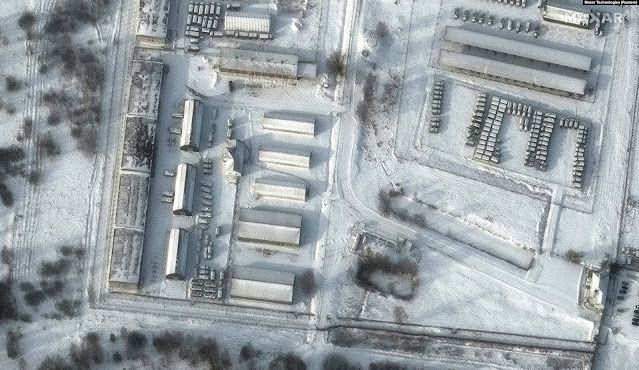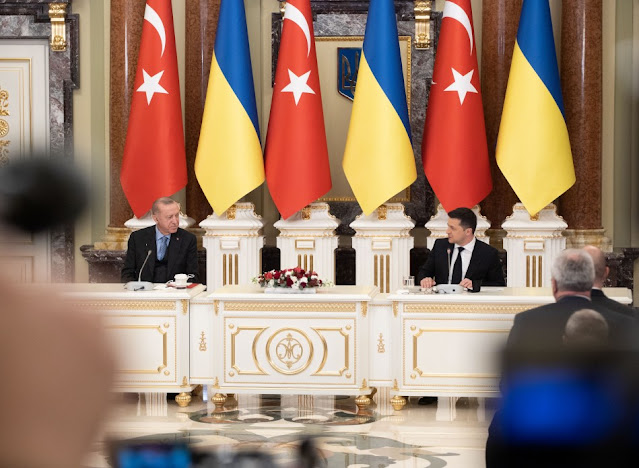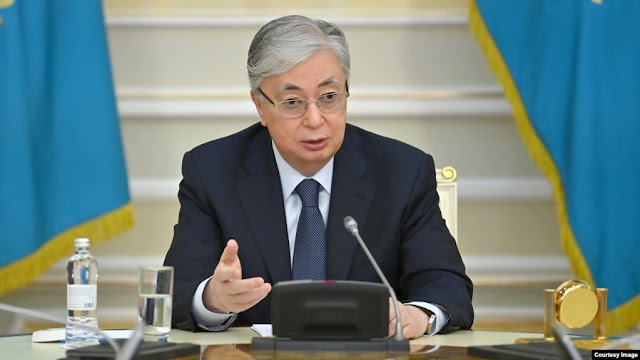THE BRETON/GEROL NEWSLETTER
POSSIBLE SCENARIOS FOR A SHADOW THEATER
For another
month public discussion continues to focus on a possible Russian invasion of
Ukraine. The US and Russia also continue to blow hot and cold about the
prospects of a global discussion on European security, showing no sign of
satisfaction over recent exchanges, but leaving the door open to further
negotiations. A lot of time is still spent trying to offer a plausible answer
as to what President Putin’s real intentions may be and to what Russia will do.
 |
| Secretary of State Blinken, Foreign Minister Lavrov Geneva, January 21st, ©RFE/RL |
In simple
terms, Putin’s foreign policy is essentially based on the principle of
advancing Russia’s interest. Whichever way you look at it, the invasion of
Ukraine would not serve these interests. Au contraire, it would
seriously damage Russia’s interests. The warnings of everyone from President Joe
Biden to Foreign Minister Mélanie Joly that Russia would face the heaviest
consequences if it invaded Ukraine are unavoidable political statements, but
they do not tell Putin anything he does not already know.
Many
observers seem to have forgotten already that Putin has stated his position
clearly before Russia’s foreign policy establishment on November 18th.
Simply put again, Putin stated that “tensions are useful and will be maintained
for as long as deemed necessary, but there will be no new conflict.” No matter whether you are ready or not to
believe Putin, this is what has happened since November. Carnegie Moscow
Centre’s Alexander Baunov has coined the formula that likely best describes
Russia’s position and the US/NATO response: “In its negotiations with the West,
Russia is behaving not like a country preparing to wage war, but like a country
that, if necessary, can afford to do so. The aim of the West, on the other
hand, is to avoid war. Consequently, Russia can exploit Western fears of
war—without actually using force.”
In agreeing to have his senior officials discuss with their Russian counterparts the idea of new arrangements for European security, President Biden has also made clear his intention to engage with Russia, even though he has in public kept emphasising that he is warning Russia not to invade Ukraine or else pay a huge economic and political price for it. In one of his impromptu press events, he clarified that there were areas (missiles and deployment of troops) where negotiations would be possible and desirable. It is also clear, however, that the US position does not include a discussion about the indivisibility of security. That is essentially the idea that States will not strengthen their security at the expense of other States. This in the Russia view is what should condition the reach and possible expansion of NATO.
The
fundamental incompatibility of US and Russian views over the scope of the
security discussions should mean there is little point in continuing, unless
the Russian side is willing to accept that the scope will be limited to
disarmament and confidence-building measures. For Russia, this would still be meaningful
but would imply settling for less than originally requested. That decision
essentially rests with Putin. He, however, would have known very well that the
US would never agree to the principle of not allowing Ukraine into NATO. He
also knows from US statements that Ukraine is not expected to be a member of
NATO for at least ten years.
Whereas we
know pretty well Putin’s intentions and his ideal objectives, we can only
speculate about his bottom line. Even though Russia initially insisted on a
quick launch of the negotiating process we also know that in comparison to NATO
counterparts Putin is in no rush and can live with the tensions he has created.
The recent announcement of selective and relatively symbolic reinforcement of
the NATO military presence in Eastern Europe was obviously not well received in
Moscow, but it does not amount to a real increase in the threat level for
Russia. What is not certain is what specific steps Putin might take, short of
starting a new conflict.
At the
right time for him and in the right circumstances, Putin could still decide to decide
to take up the US/NATO offer to re-launch European security discussions. Beyond
that, there are essentially two major options, The first one is to continue
working at getting NATO on the road to producing some reduced version of the
full security guarantees that were requested, knowing well that this is an
uncertain long-term process. This would imply working directly on individual
European members of NATO and especially on the weaker links in the NATO chain. It
is worth noting in this respect that President Putin just hosted Prime Minister
Orban of Hungary and has accepted President Erdogan’s invitation to visit
Turkey in the near future.
The second
option is to close the books for the foreseeable future on any accommodation
with NATO and, invoking NATO’s refusal to negotiate the important issues, firm
up Russia’s security position in various ways some of which may be
irreversible. There is already serious speculation about this including, for
instance, the recognition of the independence of the rebel regions of Eastern
Ukraine or upgrading the military presence in Belarus. That could also include
the actual deployment of new weapons systems.
Having
launched the current process, President Putin has to end it up with a win or,
as a minimum, a face-saving exit. He, however, controls the timeline and in the
meantime can keep the negotiation going and the other side guessing. In this
case, President Zelenskky may be offering the best advice by calling on the
West not to encourage panic.
--o--
OBSERVATIONS ON BRIEFING YOUR FRIENDS, GETTING YOUR STORY STRAIGHT AND USING A CRISIS
The Biden
administration’s early response to the unusual presence of Russian troops was
evidently first conveyed through official channels. It did not take long for
detailed information about Russian troop movements to be made public through
intelligence leaks via credible entities. Whether this was intentional, and
part of a plan will be evident later. What matters is the result. Once
intelligence about Russian actions becomes public the administration has no
choice but to adopt a very tough stance, not asking Russia to move its troops
but threatening Russia with the direst consequences should it proceed with an
invasion. Paradoxically, the heightened tension that Russia has vowed to create
provides the US side with the right context to overcome its reluctance to
engage in security discussions with Russia. What raises questions is the fact
that there seems to have been a situation where the intelligence was leaked
before it was properly shared with all relevant Ukrainian security officials in
the early days of the crisis. Pronouncements first by Foreign Minister Kuleba
and then by President Zelenskyy himself also suggest that the US did not
convince all its Ukrainian interlocutors of the severity of the Russian threat in
the same manner as the impression was created in Western media.
 |
Armed personnel carriers 35 kilometers from the Ukrainian border, January 19th |
The
Ukrainian side can explain away its lesser concern about the Russian threat by
the fact that it is already at war with Russia for many years. It remains that
even the problematic discussions between the US and Russia about European
security actually downgrade the priority that Ukrainians would like to give to
their own question. There have already been rumours about difficult discussions
recently between Presidents Biden and Zelenskyy. Zelenskky also publicly
criticized the US for removing non-essential staff from its Embassy in Kyiv. Canada
also removed it non-essential staff from its Embassy.
In late
January, the UK authorities released intelligence suggesting that in addition
to threatening war on Ukraine, Russia was planning to install a puppet régime
in Kyiv. Names were named and details were given. The whole idea has so little
plausibility that it soon was forgotten. Russia trying to do this now does not
make a lot of sense. Ukraine accepting it is even less plausible and is close
to being an insult to Ukrainian democracy. There may still be room for
improvement in Ukraine, but a puppet régime would nowadays not stand a chance.
Not long
after the UK story, major US networks cited senior US officials claiming Russia
had moved blood supplies close to the border, indicating a potential imminent
military attack. Ukraine’s deputy defence minister, Hanna Maliar, subsequently denounced
the blood supply claim, calling it a provocation designed “to spread panic and
fear in our society.” Maliar added: “It simply wasn’t true. We found no
information to back this up, we did not see any blood supplies moved to the
front or even in the civilian hospitals around the front.”
Commentators
occasionally observe that unpopular leaders will resort to war to boost their
rating. Reputable polls still place Vladimir Putin above the 60% mark. As noted
above, he said himself “no new conflict is needed.” The threat of war can
however be used as well by those who do not intend to wage war but can
nevertheless illustrate themselves at preventing it.
The beleaguered
UK Prime Minister attempted to present himself as the strongest NATO leader in
the confrontation with Russia. For good measure, Prime Minister Johnson then
added a visit to Kyiv. He eventually also put in a call to Vladimir Putin. Changing
the British newspapers' headlines for a few days may ultimately not help Johnson survive
a leadership crisis, but it offered a welcome reprieve.
 |
| PM Johnson and President Zelenskyy on the grounds of St.Sofia cathedral Kyiv, February 1st © President of Ukraine Website |
French
President Emmanuel Macron also tried to use the Ukraine crisis to bolster his
ratings in preparation for the upcoming election in which he is seeking a
second mandate. Adopting a very different approach and taking advantage of his
warm relationship with Putin (he refers to him on a first name basis and seems
to address him with the familiar “tu”) he called him twice in a couple of days
and seems intent on maintaining an active conversation with Vladimir.
The
activity of the British and French leaders makes the absence of the new German
leader even more conspicuous. After one of his military commanders commented that
Crimea would never return to Ukraine, he may have wanted to keep a low profile
but will soon join the group of leaders calling the Kremlin. Olaf Scholtz may
have to address the thorny issue of energy sanctions against Russia that others
are contemplating but that would affect Germany most directly.
--o--
MINSK PLUS?
In the US
response to the Russian proposal for security guarantees the part that deals
with Ukraine refers to the resolution of the conflict in Eastern Ukraine “on the
basis of” the Minsk Agreements. Around the same time a senior Ukrainian
security official has openly spoken against the implementation of these
agreements. The wording thus seems to confirm a slight shift of emphasis from what
was said before. The US publicly continues to call on Russia to implement the
Minsk Agreements, but in what was supposed to be a confidential document it uses a
form of words suggesting that the Minsk Agreements are a guide rather than the
final word.
Foreign Minister Kuleba later issued a statement to the effect that a special status for the Donbass area is unacceptable. Such a distinct status is a key provision of the Minsk Agreements. This essentially confirms the impossibility of implementing the Agreements in their present form.
Although
some Russian observers keep asking whether the US will eventually pressure
Ukraine to move along, there is little likelihood that this would ever happen. In what amounts to a constitutional matter, the US has no inclination or interest in pushing Ukraine and will not try. US Under Secretary of State Nuland
even claimed on a Moscow radio station never to have heard directly from the
Ukrainians that they had a problem with the Minsk Agreements. In dealing with
the Minsk Agreements the key challenge remains to come up with an improved arrangement
that is acceptable to the vast majority of the Ukrainian political class and
that still would have some appeal to Russia and the rebel regions. This may
well require focussing first on security arrangements that could bring back a form
of normalcy to life in Eastern Ukraine and to relations between that region and
the rest of Ukraine. Mediation by a country that is perceived as a true neutral
player may be a solution. Turkish President Erdogan just visited Ukraine. He keeps
offering mediation efforts. Turkey though may not be the right country and
Erdogan not the right leader at this time.
 |
| Presidents Erdogan and Zelenskyy, Kyiv, February 3rd ©President of Ukraine Website |
In the meantime, there is nevertheless in parallel a continuing conversation among Normandy Four officials about the way ahead in the implementation of the Minsk Peace Accords. There is still a need to firm up the cease-fire arrangements that would facilitate more global security discussions and might lead to a reduction of tensions on the Ukraine-Russia border. The telling comment from the lead Russian negotiator about the most recent meeting was “there is nothing to brag about here.” The Ukrainian president’s office had a much more upbeat assessment. It looks as though there was progress in process more than in substance.
--o--
WEAPONS AND TROOPS FOR UKRAINE?
There has been considerable debate in Canada about the provision of lethal weapons to Ukraine. The Canadian government claims it has received no such direct request from the Ukrainian government. Others claim it has, at least in Canada, and that there is an obligation to respond favourably. It would indeed be consistent with Canada’s political statements about Ukraine to respond positively. From a military point of view, the matter is more complex. Ukraine is in its own right an exporter of weapons and seems to have all that it needs to deal with the localised military conflict in Eastern Ukraine. Dealing with a large-scale Russian invasion would, at least in the view of some experts, require an increase in military capacity that it is impossible to achieve in the near future. The general conclusion is that beginning such a build-up at this stage is not good tactics and could even be counter productive. In that context, the current Canadian approach of providing training rather than weapons is, all things considered, a sensible one. It is useful in any event. It may not lead to immediate threat reduction, but it also does not ratchet up the tension level.
 |
| President Zelenskyy receiving FM Joly, Kyiv, January 18th |
KAZAKHSTAN TOO
The protests
that affected Kazakhstan in early January have been described at the actions of
terrorists by President Tokayev. What began as a series of protests over the
sudden increase of gas prices turned into unusually violent demonstrations.
They even compelled the president to issue a shoot-to-kill order. He also invited
troops from the Collective Security Treaty Organization's to enter the country
and provide assistance to Kazakhstan security forces, but, it seems, mostly
outside of conflict areas. The call for outside assistance may have been a way of
securing the message that the President still had the full backing of Moscow
and that protesters should have no illusion about getting any eventual support from
Russia’s political or security establishment.
 |
| President Kassim-Jomart Tokayev |
Foreign
observers are still struggling to find the right explanation for the events.
Most are still reeling from the fact that they did not see anything coming. There
was evidence of some dissatisfaction with the uneven distribution of wealth and
of animosity towards those who have become rich in the period since Kazakhstan
became independent, especially the Nazarbayev family. The stability seemed supported by a relatively good living
standard. The new President was in the process of implementing in a gradual
manner a moderate political reform process.
If the
causes of the protests still require clarification, the results have become
evident rather quickly. President Tokayev has already taken control of the
National Security Council from his predecessor during the crisis itself. He has
since firmed up his control of the government apparatus. He also has taken over
the leadership of the Nur Otan party that has the majority control of the
Parliament. He has called on those (including the family members of the former
President Nazarbayev) who have acquired considerable wealth to contribute back
to society as the same as obtaining explicit support from former President Nazarbayev.
He also has offered an ambitious economic reform agenda.
Now that the dust has settled, the government has also agreed to investigate human rights abuses that may have taken place during the protests.
The general impression
is that, as result of the tragic events of January, new impetus has been given to
a reform and modernisation process that enjoys broad popular support. Based on
the pronouncements of President Tokayev, optimism is justified. The only caveat
is the required acknowledgement by foreign observers that they failed to see
the protests coming and may not have a deep understanding of the many dimensions
of the political landscape in Kazakhstan, including the possible obstacles to President Tokayev's plans.
--o--
No comments:
Post a Comment